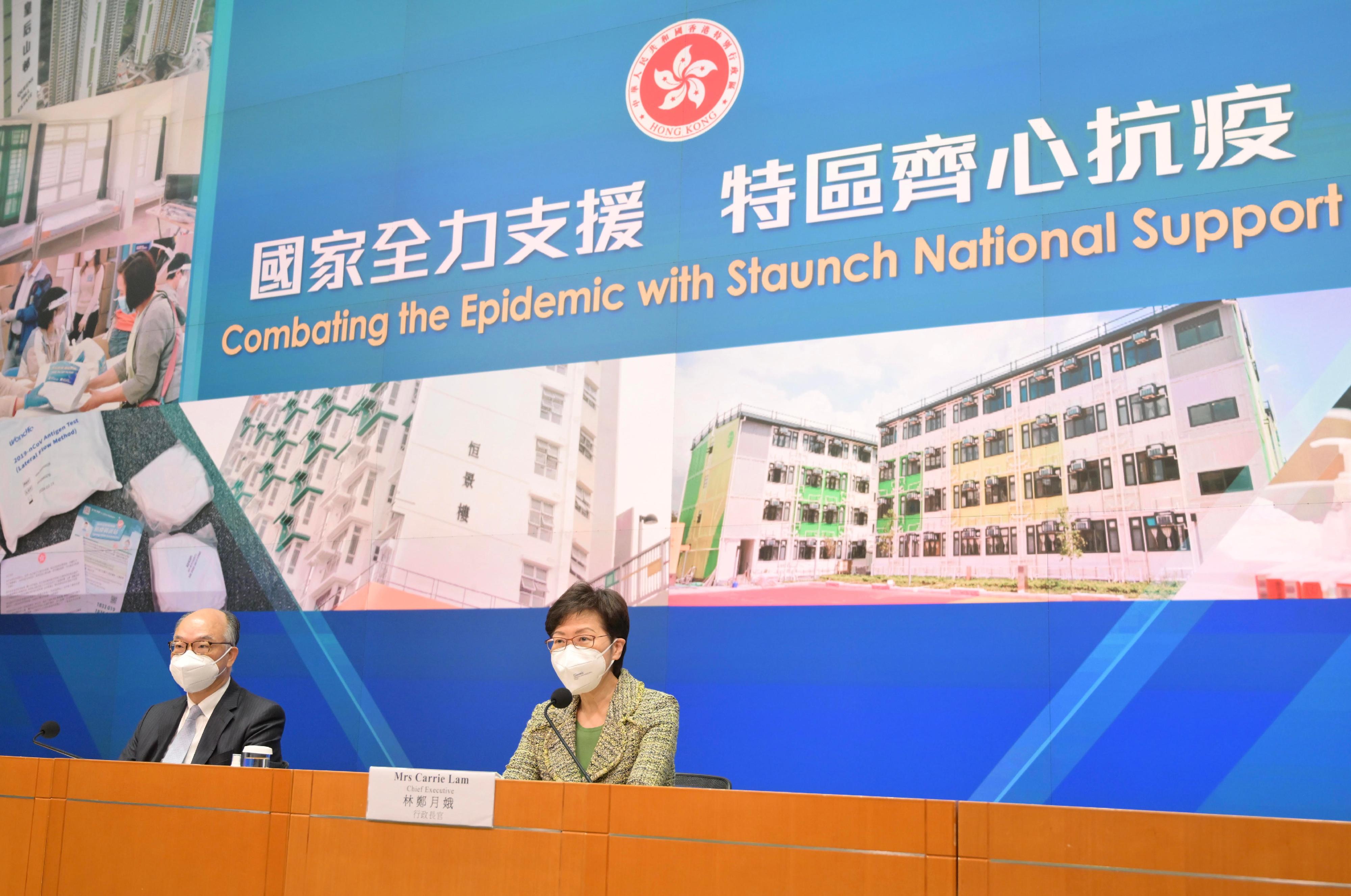Transcript of remarks of press conference on anti-epidemic measures (with photo/video)
The Chief Executive, Mrs Carrie Lam, held a press conference on anti-epidemic measures this morning (April 13). Also joining was the Secretary for Transport and Housing, Mr Frank Chan Fan. Following is the transcript of remarks of the press conference:
Reporter: Mrs Lam, Hong Kong has built more community isolation centres even while cases are dwindling. So does this mean that you will be revoking home quarantine at some point and making all positive cases and close contacts go into these government facilities like the policy on the Mainland? And secondly, given the surge of cases in the Mainland, is Hong Kong planning to review or suspend the quarantine-free Return2hk and Come2hk schemes, since under those schemes people who have not visited medium and high risk areas can still come into Hong Kong without hotel quarantine? And finally, nearly 60 airlines have triggered bans flying into Hong Kong since the start of this year, so the business community says it still wants more certainty on flights and quarantine hotel rooms even if Hong Kong residents need to quarantine for seven days. So what more will the Government do to bring clarity to the situation including reviewing the flight suspension mechanism? And will the Government consider implementing a closed-loop mechanism for foreign aircrew? Thank you.
Chief Executive: Several questions that you have raised, one is on the community isolation facilities (CIF). Yes, through the support of the Central People's Government and the joint efforts of the Hong Kong SAR Government and various sectors like the Housing Authority, the non-governmental organisations running the transitional housing projects and the hotel industry, we have built up a very good stock of CIF units, of which, in light of the latest downward trend and the decrease in the number of confirmed cases, we have come to the conclusion that we have an adequate supply. And instead of preserving every CIF for anticipated use, because they are very limited resources that have other purposes like hotel rooms that should be for the arrivals and housing units that should be for people to improve their living conditions, the Government has been vigorously reviewing the situation, and as and when possible, we try to make adjustments to enable some of these facilities to be returned to their original purpose. So today, together with the Secretary for Transport and Housing, I am announcing that the some 5 500 housing units in three blocks in two public housing estates as well as two pretty large transitional housing projects will be returned, so that several thousands of families could improve their living conditions shortly.
You asked the point about the isolation policy. We have experienced a huge surge in the fifth wave. And as a result, the Centre for Health Protection has devised a very systematic and rational process to identify those who could be isolated at home and those who need to be taken out of their home for community isolation or even hospitalisation. There is a very clear table on the Centre for Health Protection's website about the triage mechanism and the tiered arrangements for isolation. We think that this is a very rational approach and there is no intention to change it again because this will cause uncertainty and confusion to the people of Hong Kong.
In the Mainland, yes, we still have schemes which allow people from the Mainland, whether they are Hong Kong residents or non-Hong Kong residents, to come back to Hong Kong under the Return2hk Scheme and the Come2hk Scheme. We will, of course, review the situation depending on the particular place in the Mainland, where there is a higher risk then we will put in more precautions like the negative PCR (polymerase chain reaction-based nucleic acid) test upon arrival and so on. But the important thing is in the Mainland, they impose very strict rules to prevent people from an infected area to leave that area – in a way, that has helped a lot of places, not just Hong Kong, but all over the world. They are not, sort of, exporting infected cases to other parts of the country and also to the rest of the world. So for the time being, we feel that it is very appropriate to continue with these arrangements. After all, the numbers are not great.
Now about flight suspension, I have the Secretary for Transport and Housing sitting next to me who is also in charge of the aviation industry. This is still a very important component in our anti-epidemic strategy to reduce and prevent the importation of infected cases from outside Hong Kong. Because no matter how much we work and do and impose in terms of social distancing, if we keep on importing positive cases from outside of Hong Kong, that will bring risks to the people of Hong Kong. We have managed to keep Hong Kong safe for a very long time in the last two years and we will continue to do so. We have no immediate plans to relax the route-specific flight suspension restrictions that we have introduced. But for those who could come back on these return flights, if they need more quarantine hotels for the seven-day quarantine, then we are supplying more hotels. Just last evening, we issued a press release to inform the public that another three hotels will become designated quarantine hotels providing an extra 2 000 rooms for returnees to book so that they can then board a flight and come back to Hong Kong. Thank you.
(Please also refer to the Chinese portion of the transcript.)
